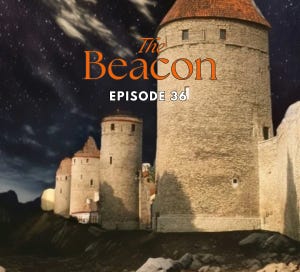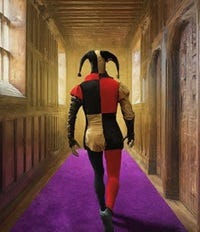From the grassy crest of the ridge just south of Blayne, Marshal Paydon Telsiora surveyed the bridge over the Highwater River. In the pre-dawn darkness, the Leitan camp on the river’s far side lay quiet but for a few cookfires being lit. Occasionally, warriors passed in front of them, making them wink.
After the regiment’s demonstration yesterday afternoon, his Leitan counterpart had doubled the guard on the bridge, and additional watchers had populated the nearby corner tower and Blayne’s southern wall. The marshal suspected that, in a show of strength, more Leitan warriors had moved south from the main camp during the night, perhaps doubling or tripling their number.
Exactly what we wanted you to do, he thought, smiling almost imperceptibly under his thin mustache. Now the king’s divisions have fewer warriors arrayed against them.
The prior evening, Paydon had ordered the catapults set up just behind the ridgeline, and before midnight, their heavily trained crews had them prepared for use. At their posts, they waited for his order to begin lobbing fire-barrels, spiked iron spheres, and small boulders into Blayne and the riverside camp. The sergeants had done their calculations, and they assured him they were well within range.

Splitting his four hundred bowmen into two companies, Paydon sent them forward under cover of darkness to hillocks to the right and left, ordering them to stay out of sight until called into action. He likewise divided his infantry into two companies, keeping one in reserve behind the ridge. As a precaution, not knowing how aggressive the Leitani might be, he had directed most of the supply wagons and all non-combatants to move south toward the Lost Wagon River Bridge.
The king’s orders, he reminded himself, as he had done many times, were to conduct a feint. He and his thousand men comprised a distraction to pin a fifth of the Leitani at the bridge, improving the odds for the main army attacking from the east. No heroics, Paydon, he said to himself. Just do the job the king gave you. And do it well. He sat straighter in his saddle.
The marshal turned to the east, looking for first light, his signal to begin the day’s activity. A soft glow climbed the sky, but he would wait until the first rays of the sun pierced through the distant peaks. Lorens’ officers, several miles east at the ford, waited for the same sign.
When the sun’s light finally stabbed through, he nodded to his colonel, Sartor Nefandal, who blew sharply on his whistle. A long moment later, the catapults bucked simultaneously, and two fiery projectiles streaked across the sky. Barrels filled with thick oil, they exploded on impact, the first against the top of Blayne’s southern wall and the second thirty yards behind the bridge, throwing burning wood and flaming liquid in all directions. Fires sprang up among the nearby tents, and a few men screamed in agony as burning splinters pierced their flesh. One warrior, his clothes aflame, jumped into the river.
Satisfied with the opening shots, the marshal said simply, “Horse,” and the colonel blew two notes on his whistle. Immediately, from below the ridge behind them, a man cried, “Forward!” Ten lines of horses, the regiment’s hundred-man light cavalry company, walked unhurriedly over the crest to their left and down the far slope, only stopping when they stood fifty yards from the bridge.
As the cavalry halted, the catapults bucked again, sending a large boulder into the Leitan camp and a spiked iron ball at the wall’s corner tower. The boulder caused more alarm than damage, though it demolished several tents and mauled a few unwary or too-slow men as it bounced through the camp. The spiked iron ball, more precisely aimed, tore through an arrow slit just above the height of the wall, opening a gaping hole.
Next, Paydon sent the infantry company after the horses. Aware that two hundred men would not impress the Leitani, who fielded at least ten times that number across the bridge, the marshal had devised a simple, parade-ground demonstration of his regiment’s maneuvering skills to fix the Leitani’s eyes on them. The infantry company marched slowly and quietly, almost solemnly, down the slope, twenty-five men across and eight rows deep, shields together. As they approached the rear of the cavalry company, the horses, sidestepping, peeled off into two wings, their riders ready to wheel toward any force advancing over the bridge.
During the prolonged maneuvers, the catapults continued to fling boulders over the river, concentrating on the wall and tower. Noticing the camp was no longer being targeted, Leitani warriors crept forward, massing behind the bridge, brandishing their weapons, and hurling war cries and insults toward the Margonni. They jeered when a boulder fell short of the wall, digging itself into the riverbank.
“Now, Colonel Nefandal,” Marshal Telsiora said in a calm voice. Immediately, one of the colonel’s aides blew a trumpet. At the sound, archers rose from their hiding places behind the hillocks and swiftly took their positions. Their captains cried, “Draw . . . aim . . . release!” Sharpshooters on the front row of the nearer right hillock let loose on the Leitan guards on the bridge, killing them all in the first volley. The rest of the bowmen on both hills aimed for the mass of warriors behind the bridge, filling the sky with arrows, most of which found marks among the tightly packed Leitani. The rebels broke and ran.
Once the marshal gave the command to advance, the infantry marched swiftly to the riverbank. A commander took a company over the bridge to secure it and prepare some rudimentary defensive works. At irregular intervals, the catapults continued lobbing boulders at the wall and tower to discourage any Leitani bowmen from targeting the soldiers digging in at the bridge.
On the crest of the ridge, the marshal and his officers and aides watched the fleeing Leitani as they reached the outskirts of the main camp. Paydon estimated that a few hundred of their fellow warriors had died at the bridge, and an equal or greater number had likely suffered wounds, many of whom would be unfit to fight. When asked about what had happened, they would spread fear among the unbloodied Leitani near Blayne’s gate, and the rumor of their rout at the hands of the Margonni would no doubt grow in the telling. And if the king’s force has fared just as well, he thought, the Leitani would be well-advised to throw down their arms and plead for pardon or scatter and hide themselves in the hills and mountains.
Sitting on his horse beside him, Colonel Nefandal cleared his throat and leaned closer, pretending to be patting the animal’s neck. “Sir,” he said in a voice just above a whisper, not wanting the other nearby officers to hear, “may I speak freely?”
“Certainly, colonel!” Paydon answered, his quick, confident, louder reply covering the distraction of his private musings. “You know I value your counsel.”
“Sir, the king insisted that our action this morning was to be a feint,” the colonel said, worry etched between his lowered brows. “We have taken the bridge, sir.”
“Quite handily, too,” Marshal Telsiora replied with a grin. “I advise patience, my good friend! Most of the day is still ahead of us. Much can change over so many hours.”
The Jester is a clean YA fantasy novella about a young man with many interests and skills who yearns to discover what he does best. First, however, he must figure out who stole the king’s dagger, and along the way, he experiences adventure, entertainment, and perhaps a wee bit of romance! Click here for the first episode!
Nefandal scowled, unsatisfied by his answer. “But, sir—” he began.
The marshal held up a gloved hand to stop his objection. “Sartor,” he said and stopped, looking around at the others, who were blatantly eavesdropping on their conversation. Recognizing it as a moment to instruct his protégés, he corrected himself, “No, all of you, consider the larger situation. We command about a thousand men, correct? Yes. The king, likely now marching his five thousand west along the road to Blayne, leads a much stronger force—five times our number.
“Now, put yourself in the place of the Leitan commander, that young Nekhesh fellow, a rank amateur, a novice. Today, his warriors lost badly at the bridge and, I will assume, at the ford. Undoubtedly, their morale is low. In their first action, they suffered heavy casualties, and they are afraid. His untrained army cannot stay where it is because, if it does, the king’s army will smash it against Blayne’s walls. Nekhesh could enter the town and force the king to lay siege, but he and his rebels are not prepared for it. They would be trapped like birds in a cage!
“So, he has a choice: He can rally his thousands to meet the king with his knights, cavalry, and stout men-at-arms in a massive, decisive battle! Or, he can look to his south and see a much smaller enemy with a hundred light horse and a few hundred soldiers and bowmen. Which of these options do you think he will choose?”
“We are the rabbit before the hounds,” the aide with the trumpet said to himself, but loud enough to be heard by all.
“A fair comparison!” Paydon replied with good cheer. “But we are not rabbits but well-trained soldiers! Now, Colonel Nefandal, why did I take the bridge?”
Eyes wide with enlightenment, Sartor answered immediately. “To delay the enemy.”
“Correct!” the marshal beamed. “You are a fine student of tactics! It is an obvious choke-point, and our archers and men-at-arms will make them pay dearly in men and time to retake it and cross it! And our horse, what is their function?”
“To harry the enemy relentlessly as they attempt to advance,” Sartor replied at once. “They will whittle down their numbers on the flanks.”
“Right again!” Paydon chuckled, rubbing his hands together. “What else?”
The colonel thought for only a moment before continuing. “The crest of the ridge, where a hidden battalion of infantry awaits, is the next point of contention. Our archers will have found a new position and will bloody the rebels as they come over the top, while the cavalry will try to keep them in a narrow column along the road. We will make an orderly retreat toward the Lost Wagon River Bridge and defend it. Perhaps by then, the enemy will be more worried about the king’s army at their rear.”
“Precisely!” the marshal said, smiling and applauding decorously. “That is the plan! But plans often do not survive first contact! Remember that! Be ready for anything!”
A note:
Marshal Paydon Telsiora was a second son of a second son and far down the list of the current Duke Telsiora’s heirs. Showing an early inclination and aptitude for soldiering, his father had enrolled him in the Royal Military Academy, where he had excelled. His rise to the rank of marshal, entirely on merit, was among the quickest in several generations. Lorens III trusted him implicitly to understand his aims, use clever and effective tactics, and keep his head during the most chaotic engagements. Margonni historians claimed he resembled his ancestor, the first Telsioran duke, Erasto, in his excellent military mind and aristocratic looks and bearing.
If you have enjoyed what you read on this Substack, please consider buying me a cup of coffee!










I would hate to play chess with Marshal Paydon Telsiora! :)